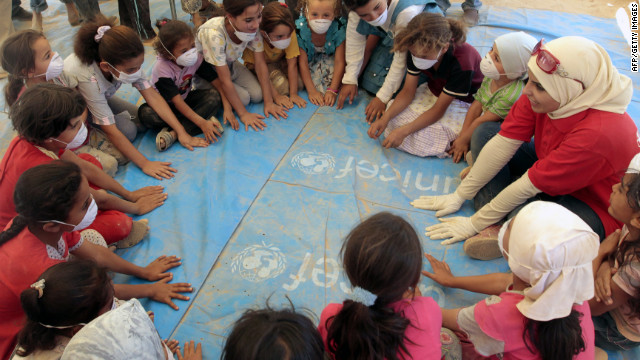Negotiating with Syria's allies is the only way to end the bloodshed and avoid the mistakes made in Iraq, say As... http://bit.ly/PpLgXC
9:34 PM - 15 Aug 12 via twitterfeed · Details
To save Syria, work with Russia and Iran
By Asli Bali and Aziz Rana, Special to CNN
August 15, 2012 -- Updated 1146 GMT (1946 HKT)

Syrian refugee children playing on Saturday in a tent at the Zaatari refugee camp in Jordan.
STORY HIGHLIGHTS
- Bali and Rana: To save Syria, bring Russia and Iran to the international diplomatic table
- Removing al-Assad will be more costly in the long run than most analysts suppose, they say
- To defeat the regime, U.S. and its allies would have to heavily increase destruction, they say
- The current international approach seems likely to repeat U.S.'s mistakes in Iraq, they say
Editor's note: Asli U. Bali is an acting professor of law at the University of California, Los Angeles. Aziz F. Rana, an associate professor of law at Cornell, is the author of "The Two Faces of American Freedom."
(CNN) -- As the violence intensifies in Syria, external powers, including the United States, are embracing increasingly belligerent positions. Indeed, in recent days the United States and Turkey have announced plans to study a no-fly zone after calls by many American commentators for a more direct military role.
Although there is no doubt the government of President Bashar al-Assad carries the overwhelming responsibility for the unfolding tragedy in Syria, the attempt to militarily defeat the regime is the wrong strategy if the goals are reducing violence and protecting innocent civilians.
The best strategy for those who wish to avoid a protracted war in Syria is to bring Russia and Iran to the international diplomatic table. Russian and Iranian participation are essential to a viable post-al-Assad transition; the alternative, a transitional plan generated exclusively by the United States and its allies, can be accomplished only through force.
To insist on the military path without engaging Assad's backers is to condemn Syrian civilians to escalating violence in pursuit of regime change.
To date, external backers of the two sides have focused on armingtheir local proxies rather than negotiating. Russia and Iran have reiterated their commitment to the Assad government, both diplomatically and through direct support. Recent reports suggest that the United States has doubled down on funding the rebels with a secret presidential order authorizing military assistance (stopping short for now of actual "lethal aid," which has been outsourced to Saudi Arabia and Qatar, in coordination with Turkey).

